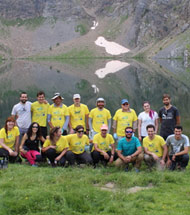LICA researchers from the University participate in the study on the ecological status of the Pyrenean lakes.
The team, formed by researchers from high school Pyrenean Ecology and the universities of Navarra, Basque Country and Pau et de Pays de L'Adour, has taken samples of water, sediments and other physico-chemical parameters from Sabocos Lake.

PHOTO: Courtesy
Scientists of the network REPLIM study the Pyrenean lakes and peatlands in a project led by the high school Pyrenean Ecology (IPE) -center of the committee Superior Center for Scientific Research (CSIC)- in which participates the laboratory Integrated Environmental Quality (LICA) of the School of Sciences of the University of Navarra. The goal is to draw up a strategic plan for management and protection that will provide recommendations to managers on the conservation of these ecosystems.
As part of the activities of the projectAs part of the IPE activities, a team formed by researchers from IPE and the universities of Navarra, Basque Country and Pau-Pays de l'Adour (France) has carried out different works in the Sabocos lake, near Panticosa. The scientists have collected several water samples at various depths (depending on the temperature profile ) to analyze later on the laboratory various chemical parameters. In addition, data also collected temperature, pH, conductivity and oxygen content throughout the water column and downloaded the temperature data of the loggers that were placed last year. Also, along the project other lakes in the mountain range have been sampled.
The role of LICA researchers at project -DavidElustondo, Esther Lasheras, Sheila Izquieta, Carolina Santamaría and Chusmi Santamaría- is focused on the study of greenhouse gas emissions by peatlands and on the effect that changes in temperature and precipitation projected by global circulation models will have on their future behavior. For David Elustondo, researcher of laboratory, the study of these unique ecosystems is particularly interesting, "since peatlands are large carbon sinks capable of storing a third of the atmospheric CO2 sequestered in soils worldwide (up to 75% of atmospheric CO2 in pre-industrial times). There is currently great concern about what their evolution will be in response to climate change, as they may leave the role of atmospheric CO2 sink that they have played for millennia, to become net emitters of greenhouse gases, thus greatly increasing the concentration of CO2 in the atmosphere and multiplying global warming."
Measuring climate change in particularly sensitive areasThe Pyreneannetwork of observatories of ecosystems vulnerable to climate change -lakes and peatlands- is designed to respond to the challenge to assess the impact of climate change on the territory and develop mitigation and adaptation policies based on the scientific knowledge . For this purpose, in this project several lakes and peat bogs have been selected in the Pyrenean mountain range in which to monitor the effects of climate change, because mountain areas are particularly sensitive and vulnerable, and include particularly sensitive ecosystems such as glaciers, mountain lakes or peat bogs. These systems are, therefore, very suitable for the study of climate variability and the early detection of changes induced by climate change.
The project REPLIM - in which the LICA of the University of Navarra collaborates - aims to improve cooperation between scientific centers, management entities and citizens, by establishing a network of observatories of these vulnerable ecosystems that will make it possible to characterize climate change at both local and territory-wide scales, identifying past, recent and foreseeable impacts in the future. This network aims to homogenize climate change indicators, raise public awareness of its impacts and help define a strategy of management integrated with the social and economic development of the Pyrenean territory. Although the project REPLIM ends in 2019, the continuity of the established network will contribute to the development and implementation of the strategy and action plan of the Pyrenean Climate Change Observatory in the coming years.
This project is co-financed by the European Regional Fund development , ERDF through the POCTEFA 2014-2010 program. It includes research centers from the Basque Country, Navarra, Aragon and Catalonia, from the French Departments New Aquitaine and Occitania and from Andorra. Finally, the Geological and Mining high school , the CHE, the Sobrarbe County and the Sobrarbe Geopark participate as partners.
